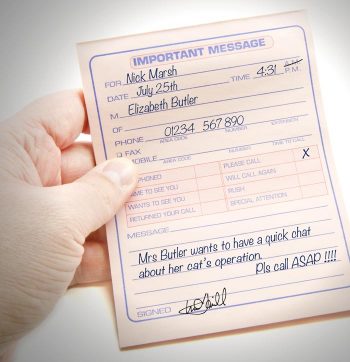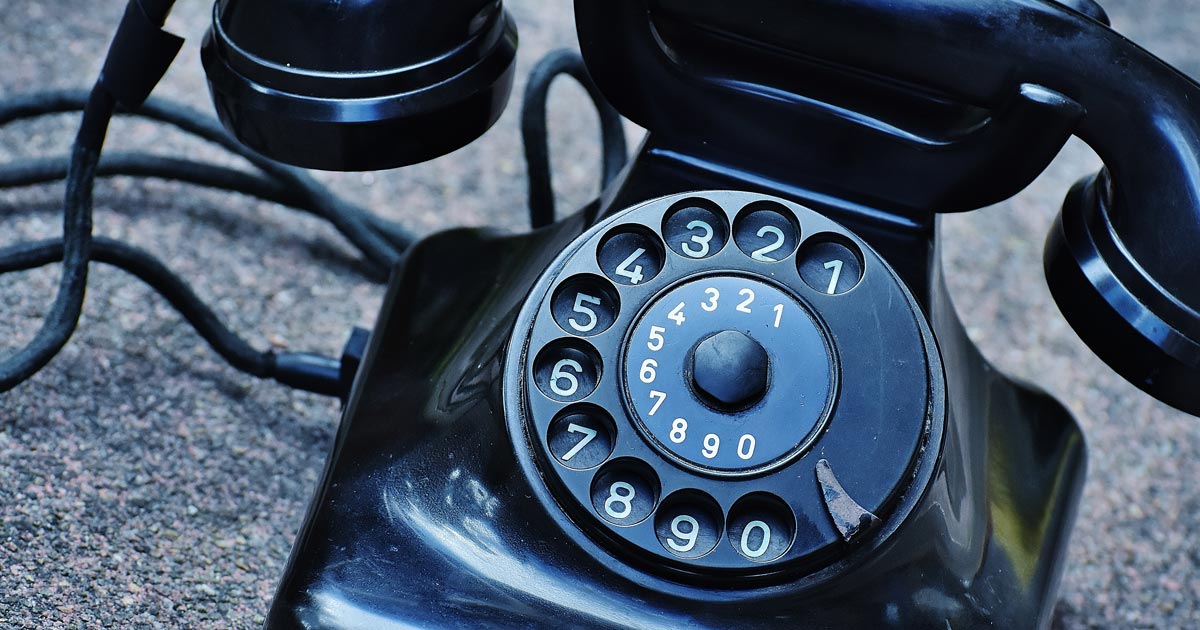I’m not a fan of the telephone. I don’t mean my smartphone (you’d be hard pressed to prise that from my fingertips), I mean the telephone – the 19th century invention that all started with “Mr Watson, come here. I want to see you”.
I appreciate it has revolutionised communication and changed society completely – probably for the better – but it’s also the rudest thing I have in my house (apart from a couple of old Viz annuals).
To me, the telephone isn’t a useful communication device, it’s a tiny object that suddenly screams for attention, no matter where you are or what you are doing, and won’t stop screaming until you have picked it up and spoken to it. It’s worse than a baby – at least a baby smiles at you every so often (although, admittedly, no telephone has ever vomited curdled milk into my hair).
Not only that, when you do pick up the handset, you then immediately have to talk to someone.
Averse to conversing
For an introvert like myself, the prospect of being dragged without warning into a conversation with another human in the middle of an otherwise peaceful afternoon fills me with dread. The idea of laying down to have a “natter” for an hour or two sounds like my idea of hell.
It’s not that I don’t like talking to friends, it’s just I generally prefer to do it face to face, or (if that’s not possible) at least doing it against a backdrop of a computerised zombie attack to smooth over any awkward lulls in conversation.
Added to this, years of out-of-hours work, where the telephone can suddenly – out of the blue – transform your day into one of the worst in your career and you may begin to understand my dislike of Mr Bell’s wondrous invention.
I may be in the minority, but I suspect I am not on my own – what else would explain the instant and unexpected success of the text message?
My nemesis

A part of the job of a veterinary surgeon is particularly thankless, unrewarding and time-consuming and, given my preamble, there are absolutely no prizes for guessing what I want to talk about – telephone messages.
Telephone messages build up throughout the day, but have a nasty habit of flocking together in great numbers when you’re having a particularly busy one.
Practices have many different ways of dealing with them – slips of paper, email messages and so on – but the one I am most used to and seems to work best is a message book. This is a list of telephone calls that have come in through the day, each of which is to be crossed off as they are completed.
That bloody book! My nemesis. On a busy day, watching the list grow and grow, and grow – when so much else needs doing, no prospect of lunch is likely, rushing to the toilet seems like a blessed luxury and a long, overbooked evening surgery is stretching out before you – the message book lurks in the background, gnawing on your nerves and weighing you down with guilt that worried owners are waiting for a telephone call back, and slitheringly reminding you there’s no prospect of you leaving until all those messages are crossed off.
Avoiding the inevitable
As with everything else in the veterinary day, the message book is unpredictable, but it also feels particularly cruel because (at least in practices I have worked at) no time is scheduled in the day to sit down and telephone people – too much else needs to be done.
You have to try to squeeze the telephone call in between consults, operations or during the five minutes you’ve found to scoff your lunch (hoping the owner can’t tell you’ve got a mouthful of sandwich), in a desperate attempt to allay the inevitable (and understandable) “I was told he’d telephone back, but he hasn’t yet” telephone call, which will lead to the telephone message being highlighted and, in dire situations, several exclamation marks being added to it.
On the face of it, scheduling a specific time to deal with your telephone messages may seem like a sensible solution, but I suspect it wouldn’t work – the volume of messages varies so much from day to day that you would inevitably get dragged into something else and, Sod’s Law being what it is, all the messages would come in the second this allocated time was over.
Deciphering and delaying

The innocuous nature of the message in the book frequently bears very little resemblance to the conversation you are about to submit yourself to.
For example, “question about snakes” could be anything from adder bites to breeding information, but you’ll worry about it from the moment you see it in the book.
One thing I have learned over the years is “quick chat” always means the exact opposite and is likely to leave you tied up for 45 minutes or more – it’s the message book equivalent of “I’m not being racist, but…”.
A further problem with the message book is the lack of immediacy. It’s a book that sits on reception and weighs on your mind, but it doesn’t grab your time quite so successfully as a road traffic collision that’s been rushed in through the door, a colleague who’s having trouble with an operation or some blood results that have arrived from your collapsed inpatient.
I doubt anyone joined the profession because they wanted to spend more time on the telephone, but all those messages need to be addressed just the same.
Driven to distraction
The difficulty with this is some of the – and the politest way I can put this is “less conscientious” – members of your team may not consider finishing those messages as absolutely essential before they head off.
I am not, in general, a violent man, but finding out a certain colleague has once again buggered off home without checking the message book, and left me with a stack of queries from angry clients who want to know why they weren’t called back earlier, is almost enough to drive me to homicide.
If this post has seemed like less of an insight, more of rant, and a rant against a blameless and highly useful piece of technology, I have one thing to say in my defence: “Oh bugger, sorry, I’d better go. The telephone is ringing.”

Leave a Reply